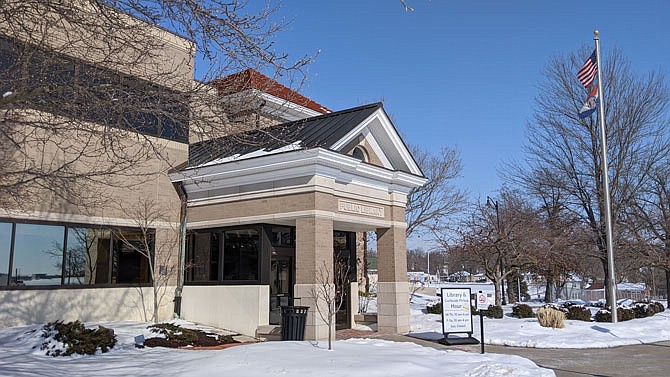Though young people of color face societal challenges, there's plenty community members can do to offer support.
"When there's an issue in the community, you can sit around and talk about it or you can do something about it," said Verna LaBoy, community activist founder of you Columbia's Worley Street Roundtable. "You don't have to play small here. People of like minds will get with you if you come the right way."
Panelists shared their thoughts during a virtual forum Wednesday titled "Minority youth: Inequities in Justice."
The forum, co-sponsored by Daniel Boone Regional Library, the League of Women Voters of Columbia-Boone County, Alpha Kappa Alpha Sorority, Kappa Chi Omega Chapter, Boone County Children's Services Board, Mid-Missouri Civil Liberties Association, the Minority Men's Network and the NAACP of Columbia, was the second in a two-part series.
The first part focused on the issue itself. In Missouri, Black students are about 4.5 times more likely to receive an out-of-school suspension than their white classmates, the American Civil Liberties Union observed. Those early run-ins with authority can lead to children leaving school and entering the criminal justice system, a process called the "school-to-prison pipeline." Black youth in Missouri are 4.6 times as likely to be held in custody than white youth.
"Over the past two decades, this path has grown significantly," said Lauren Williams, DBRL's adult and community services manager.
But Wednesday's focus was on finding community- based, concrete solutions.
Community efforts
Initiatives discussed Wednesday approached the issue from two different angles: addressing systemic biases at schools and among law enforcement that lead to harsher treatment of minority youths and supporting minority youths so they don't come into contact with the juvenile justice system in the first place.
Panelist Joanne Nelson helped study the issue in Boone County through the Voices for Collective Impact study, funded by the Boone County Children's Services Board. Those conducting the study held standardized focus groups in January 2020, during which they spoke to youths about the issues they see in the community and the solutions they'd propose.
From those conversations, VCI compiled a list of recommendations to be implemented in the community. On the system side, they suggested training for school personnel and educators, expanded community policing and local gun-control measures.
LaBoy agreed training educators and law enforcement to be aware of their own biases - and as empathetic toward Black children as they are to white children - is important.
"A lot of times, if a young person of color has a bad day, has a meltdown, they find themselves handcuffed with a juvie officer," she said. "That's not OK. We watch white children have same kind of meltdowns and it's 'Johnny's just having a rough time.'"
LaBoy is involved with Family Access Center of Excellence, which both helps provide mental health support for youths and families in Boone County and helps make authorities aware of the resources available to people who need help.
"The reason I sit on the board is I want to help law enforcement get it," she said. "Stop taking young people to the juvenile office when it's a mental health breakdown."
Nelson said youths want to get involved, too.
"Youth wanted to be involved in making decisions within school and communities," she recounted. "One youth said, 'I feel like whenever something traumatic happens and (adults) don't talk about it you're acting like it never happened.'"
Young people are also interested in mentorship opportunities, group activities and youth centers. Nelson highlighted the particular need for teen-friendly hangout spots in rural areas.
"Youths identified, during focus groups, the importance of mentorship for themselves and peers," she said. "They expressed wanting to have support from someone who's had similar experiences."
One such program already in existence in Columbia is Cor, which offers mentoring, tutoring and activities for youths of color who are involved in sports at Columbia's high schools. Several Cor participants offered their insights about how Cor has helped them.
"I think it really helped me with getting my voice out there, things I want to do, help out with in the community," said Rickie Dunn, a high school student in Columbia.
Dunn noted he and other young men have a lot of spare time thanks to COVID-19.
"Cor can help other people our age by giving us something to do instead of just being out running around - all that causes is trouble," fellow participant Alijah Jackman said. "They make sure we get our work done - that's something a lot of kids need; something to push them, something to keep them busy during the day."
How to help
LaBoy encouraged people to form mentoring relationships with young people in their own communities - even if a formal program like Cor isn't available. It's better than complaining and doing nothing, she said.
"You have so much talent, so many gifts that are untapped," she said. "Look at these young people who need mentors. If you're so smart and you know everything, deposit that into some young people."
LaBoy also urged people to work on addressing the stigma around mental health issues. The stigma keeps many people from reaching out for help, even when there's help available.
Lastly, she suggested being willing to work with and offer help to people in positions of authority, not just berate them.
"Who wants to listen to someone who's beating you up all day long?" she asked rhetorically.
Williams made available a list of groups serving area youths which need volunteers. A number - including Central Missouri Foster Care and Adoption Association, Central Missouri Community Action, Great Circle, Food Bank for Central and Northeast Missouri, Job Point and CASA - cover Callaway County as well as Boone.
To view upcoming DBRL virtual events, visit dbrl.org/events.

